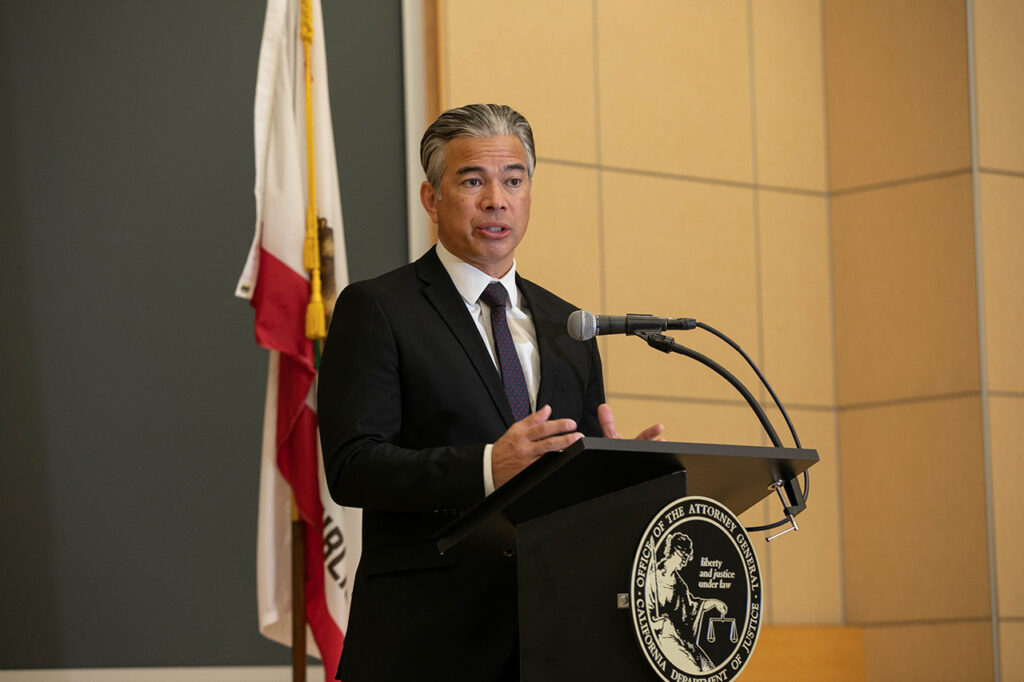
Attorney General Rob Bonta
Credit: Office of the Attorney General
California Attorney General Rob Bonta filed a lawsuit today against Chino Valley Unified asking the San Bernardino County Superior Court to end a district policy that requires school staff to tell parents if their child asks to be identified by a different gender or name, or accesses a bathroom or program that don’t align with the gender on their official records.
The lawsuit also asks the court to issue a preliminary injunction to halt the district policy immediately to protect the safety of transgender and gender-nonconforming students in the school district while the court case proceeds.
“In its function, in its text, and in its context this policy is disruptive,” Bonta said at a news conference Monday morning. “It’s discriminatory, and it’s downright dangerous. It has no place in California, which is why we have moved in court to strike it down.”
The Attorney General’s Office filed the case after completing a civil rights investigation of the district. The investigation found that the policy, passed on July 21, discriminates against transgender and gender-nonconforming students, violates their constitutional and civil rights, and threatens their mental, emotional and physical well-being, Bonta said.
“Let’s call this policy what it is. It’s a forced outing policy,” Bonta said.
The policy violates the constitutional right of all California students to be treated equally, regardless of their gender, gender identity, or gender expression, Bonta said. It violates California’s equal protection clause, and it violates California’s constitutionally protected right to privacy, he said.
Transcripts and recordings of the Chino Valley Unified board meetings reveal that trustees were motivated by a desire to harbor animosity, discrimination and prejudice, Bonta said.
“Transgender and gender-nonconforming students were described as suffering from a mental illness and perversion,” Bonta said. “There were claims that policies protecting these students are a threat to the integrity of our nation and the family system as we know it. One board member even went as far as to publicly state that transgender and gender-nonconforming individuals need non-affirming action from their parents to get better.”
Chino Valley Unified officials weren’t notified that the lawsuit was filed until after media outlets began to report on it Monday morning, said Andrea Johnston, district spokeswoman, in an email.
Johnston did not provide a district official for an interview with EdSource, saying district officials were still reviewing the lawsuit with attorneys. But, Johnston did dispute Bonta’s allegation that the policy puts transgender students at risk.
“The district’s policy does protect transgender students by requiring staff to notify CPS/law enforcement if the student believes they are in danger or have been abused, injured, or neglected due to their parent or guardian knowing of their preferred gender identity. In these circumstances, CVUSD staff will not notify parents or guardians, but rather, wait for the appropriate agencies to complete their investigations regarding the concerns shared by the student.”
Johnston said that the district has been transparent in its dealings with the Attorney General’s office on the matter, providing it with all the requested documents and records.
“Superintendent (Norm) Enfield spoke with the DOJ’s legal counsel weekly to confirm the district was providing requested files, which had changed several times from the original subpoena,” she wrote in the email.
Students who submitted declarations for the lawsuit said the board policy has made them fear for their safety and has caused them to become withdrawn in school.
“It presents students with a terrible choice, either walk back your rights to gender identity and gender expression, to be yourself, to be who you are, or face the risk of serious harm, mental harm, emotional harm, physical harm,” Bonta said of the policy.
Temecula Valley Unified, Anderson Union High School District and Murrieta Valley Unified also have passed parent notification policies, but aren’t included in the complaint. If the state wins its case, districts with the exact same policy will also be prohibited from using it, Bonta said.
“We are standing up for our children today, not allowing their rights to be trampled, not allowing them to be put in harm’s way by a school board who is not complying with California law,” Bonta said.




